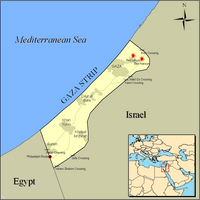Israel Responds to Hamas Prisoner Swap Offer
Tuesday 16 rights groups, including Amnesty International and Oxfam, said, the world has "betrayed" civilians in Gaza by failing to end a blockade of the Hamas-run enclave.

"The international community has betrayed the people of Gaza by failing to back their words with effective action to secure the ending of the Israeli blockade which is preventing reconstruction and recovery," said the report.
Israel and Egypt have allowed only vital humanitarian aid into the territory since the Islamist Hamas seized power there in June 2007.
"It is not only Israel that has failed the people of Gaza with a blockade that punishes everybody living there for the acts of a few," said Jeremy Hobbs, executive director of Oxfam International.
"World powers have also failed and even betrayed Gaza's ordinary citizens. They have wrung hands and issued statements, but have taken little meaningful action to attempt to change the damaging policy that prevents reconstruction," AFP reports.
Meanwhile, defense Minister Ehud Barak on Tuesday stressed Israel's responsibility to bring abducted soldier Gilad Schalit home, albeit not at any price.Barak's comments followed the inner cabinet meeting Monday night for final marathon discussions, and while speaking about the state's obligation to the soldier, he kept mum on details of the Israeli response.
"We are intensively formulating the correct way to promote the Schalit topic," Barak told high school students in Rishon Lezion. "This is a sensitive time and it would be wrong to expound upon the topic, but we, as those who sent Gilad, feel a responsibility… to make every feasible and worthy move to bring Gilad home, though not at any price."
Barak, who is a member of the inner cabinet, responded to criticism leveled at the potential price Israel would pay by releasing hundreds of convicted killers for one Israeli soldier, Jerusalem Post reports.
It was also reported, a Palestinian close to the negotiations had said the German mediator carrying Hamas' proposal had given Israel until Wednesday to take respond. The Palestinian, who spoke on condition of anonymity because of the secret nature of the talks, said there would be no further negotiations.
Prisoner swaps are controversial in Israel because of their potential to encourage militants to take more hostages. But the drawn-out plight of Schalit and his family has touched many hearts in Israel, where military service is compulsory and families expect the army to do all it can to protect their children.
Bringing Schalit home could boost Prime Minister Benjamin Netanyahu domestically, given the Israeli public's deep concern for the young soldier's fate. But it could also hurt the prime minister's standing among Israelis who feel releasing prisoners convicted of violence would only invite more bloodshed.
Israel has balked at meeting the Hamas demand to release Palestinians convicted of particularly shocking violence, such as the bombing of a Passover celebration that killed 30 people in 2002.
It also wants some prisoners deported to Gaza or overseas, rather than to their West Bank homes, on the assumption they would be less able to harm Israel from the isolated coastal strip along the Mediterranean, Ha'aretz reports.
Subscribe to Pravda.Ru Telegram channel, Facebook, RSS!


